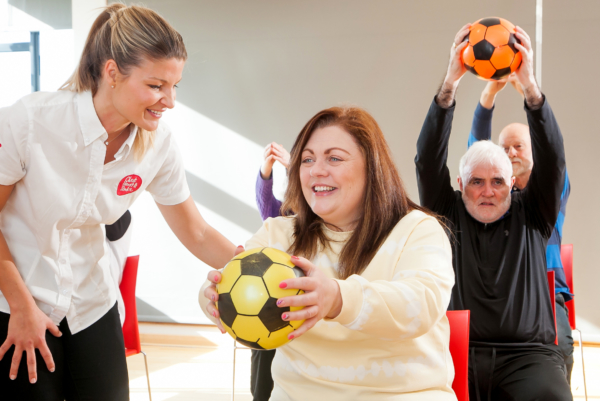
After suffering a devastating stroke last year, 47 year old mum of four Eilish Briggs from Banbridge says the NICHS PREP programme ‘saved her’.
A carer to her teenage son, Michael, it was a normal, hectic day for Eilish when she was struck by her stroke. Eilish says, “I was getting Michael ready when my face started to feel funny. I looked in the mirror and I could see my mouth was drooping on the left hand side. My twin sister has Bells Palsy and sometimes her face would droop because of that. I thought, oh no, is this going to be me now with the same thing?”
“I carried on getting Michael ready and the droop was getting worse. Then when I’d finished, I took a picture of my face and sent it to my sister. She replied and said you might be having a stroke, you need to get seen to. I sent the photo to another friend too and she phoned me straight away and said the same, and told me to call an ambulance.”
“My boyfriend at the time drove me down to Daisy Hill Hospital, and while we were on the way, my arm and leg began to go numb as well. When we got into the hospital it was all systems go. I have no concept of time while we were in there, but they took me for a CT scan and told me I’d had a stroke while I was still lying in the scanner.”
“They gave me Thrombolysis treatment and I was transferred to the stroke unit, where I stayed for nine days. I was seen by a physio and some of the movement came back in my arm and my leg, although they felt extremely heavy and I didn’t have much grip. My speech had also been affected but it came back too. I thought to myself, ‘Thank goodness I’m okay’ – but I didn’t know yet just how much it would affect me mentally.”
Eilish is now passionate about raising awareness of the invisible impact a stroke can have on a survivor. “Everybody knows the signs of a stroke and F.A.S.T. but nobody is aware of how it affects people, even as they get their mobility back. It can be the other stuff that can be just as hard to deal with. It affects your thinking, your understanding. When you’re really tired, that side of my face can droop again and my leg would get heavy and its nearly like it’s happening all over again – it’s very scary. And the fatigue just hits you – it’s an absolutely shocking part of it.”
“People look at you and they think you look fine, so you must be fine - and you’re not. You’re struggling on.”
Eilish has also felt all too well the impact her stroke has had on her role as a mother. “My son Michael needs a lot of help with care and treatments, and my other son, Adam, had just started high school in first year when I had my stroke. It was a big transition for him and I felt awful I wasn’t able to be there. My kids are so good and understanding, they will take a look at me and say, ‘Mummy, you need to go lie down’. But it is still tough.”
“I was a big home cook before, but I couldn’t even think now what I’m going to make or what I need to do to cook a recipe. Noise also affects me now and it’s terrible because I used to love it when my kids would all come in and they’d be in the kitchen, all laughing and carrying on, shouting and squealing, but now I can’t deal with it.”
“I’m missing out and they’re missing out on their mummy being her normal self.”
Eilish was referred to the NICHS PREP Programme, and has found it to be a lifeline for her. “The PREP programme I feel has saved me. I felt completely and utterly lost. As much as my family are great, nobody truly understands how it affects you emotionally. You don’t react to things the same way - sometimes you just feel completely and utterly numb, or sometimes you overreact and might break down crying over something small. But with the group, being able to talk to each other about what’s been going, how we’re feeling, what we’re struggling with and them understanding is so helpful. I no longer feel I’m alone.”
“With the other girls, and everyone at the group, even though we all might have been affected in slightly different ways or to different extents, we all understand, we all listen and we can all bounce things off each other.”
“The physio and the exercises we do at the group are also brilliant – I do them at home after the groups and I’ve been noticing a big difference in my weak side. We also have information sessions about stroke and our health with a cup of tea or coffee at the end, and it is so beneficial as well. There were things I never knew about fatigue that I’ve now learned and it helps make what you’re going through make sense. It’s relatable.”
To someone going through a stroke like her, Eilish says, “Go along to the group as soon as you can and get that support - because you need it.”
